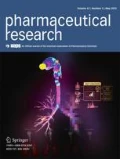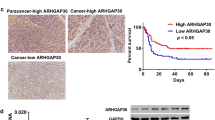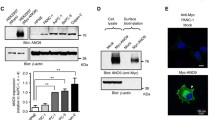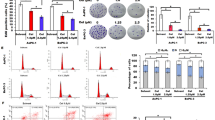ABSTRACT
Purpose
Pancreatic cancer remains the fourth most common cause of cancer-related death in the United States. Therefore, novel strategies for the prevention and/or treatment are urgently needed. Genistein has been found to be responsible for lowering the rate of pancreatic cancer. However, the molecular mechanisms by which genistein elicits its effects on pancreatic cancer cells has not been fully elucidated. Therefore, the purpose of the current study was to elucidate the anti-cancer mechanism(s) of genistein.
Methods
Multiple molecular techniques, such as Real-time RT-PCR, Western blot analysis, invasion assay, immunofluorescence assay, gene transfection, MTT assay, and Histone/DNA ELISA, were used.
Results
We found that genistein inhibited cell growth accompanied by induction of apoptosis with concomitant attenuation of FoxM1 and its downstream genes, such as survivin, cdc25a, MMP-9, and VEGF, resulting in the inhibition of pancreatic cancer cell invasion. We also found that down-regulation of FoxM1 by siRNA prior to genistein treatment resulted in enhanced cell growth inhibition and induction of apoptosis.
Conclusion
This is the first report showing the molecular role of FoxM1 in mediating the biological effects of genistein in pancreatic cancer cells, suggesting that FoxM1 could be a novel target for the treatment of pancreatic cancer.






Similar content being viewed by others
Abbreviations
- ELISA:
-
Enzyme-linked Immunosorbent Assay
- FoxM1:
-
Forkhead box protein M1
- MMPs:
-
Matrix metalloproteinases
- MTT:
-
3-(4,5-dimethylthiazol-2-yl)-2,5-diphenyltetrazolium bromide
- RT-PCR:
-
Reverse transcription-PCR
- VEGF:
-
Vascular endothelial growth factor
REFERENCES
Jemal A, Siegel R, Ward E, Hao Y, Xu J, Thun MJ. Cancer statistics, 2009. CA Cancer J Clin. 2009;59:225–49.
Sarkar FH, Li Y. Mechanisms of cancer chemoprevention by soy isoflavone genistein. Cancer Metastasis Rev. 2002;21:265–80.
Sarkar FH, Li Y. The role of isoflavones in cancer chemoprevention. Front Biosci. 2004;9:2714–24.
Sarkar FH, Li Y. Soy isoflavones and cancer prevention. Cancer Invest. 2003;21:744–57.
Sarkar FH, Li Y. Using chemopreventive agents to enhance the efficacy of cancer therapy. Cancer Res. 2006;66:3347–50.
Wang Z, Zhang Y, Banerjee S, Li Y, Sarkar FH. Inhibition of nuclear factor kappab activity by genistein is mediated via Notch-1 signaling pathway in pancreatic cancer cells. Int J Cancer. 2006;118:1930–6.
Wang Z, Banerjee S, Kong D, Li Y, Sarkar FH. Down-regulation of forkhead Box M1 transcription factor leads to the inhibition of invasion and angiogenesis of pancreatic cancer cells. Cancer Res. 2007;67:8293–300.
Fu Z, Malureanu L, Huang J, Wang W, Li H, van Deursen JM et al. Plk1-dependent phosphorylation of FoxM1 regulates a transcriptional programme required for mitotic progression. Nat Cell Biol. 2008;10:1076–82.
Laoukili J, Stahl M, Medema RH. FoxM1: at the crossroads of ageing and cancer. Biochim Biophys Acta. 2007;1775:92–102.
Ahmad A, Wang Z, Kong D, Ali S, Li Y, Banerjee S et al. FoxM1 down-regulation leads to inhibition of proliferation, migration and invasion of breast cancer cells through the modulation of extra-cellular matrix degrading factors. Breast Cancer Res Treat. 2009 (in press).
Bhat UG, Halasi M, Gartel AL. FoxM1 is a general target for proteasome inhibitors. PLoS One. 2009;4:e6593.
Pandit B, Halasi M, Gartel AL. p53 negatively regulates expression of FoxM1. Cell Cycle. 2009;8:3425–7.
Park HJ, Carr JR, Wang Z, Nogueira V, Hay N, Tyner AL et al. FoxM1, a critical regulator of oxidative stress during oncogenesis. EMBO J. 2009;28:2908–18.
Yokomine K, Senju S, Nakatsura T, Irie A, Hayashida Y, Ikuta Y et al. The forkhead box M1 transcription factor as a candidate of target for anti-cancer immunotherapy. Int J Cancer. 2009;126(9):2153–63.
Wierstra I, Alves J. FOXM1, a typical proliferation-associated transcription factor. Biol Chem. 2007;388:1257–74.
Gartel AL. FoxM1 inhibitors as potential anticancer drugs. Expert Opin Ther Targets. 2008;12:663–5.
Radhakrishnan SK, Gartel AL. FOXM1: the Achilles’ heel of cancer? Nat Rev Cancer. 2008;8:c1.
Wang IC, Chen YJ, Hughes DE, Ackerson T, Major ML, Kalinichenko VV et al. FoxM1 regulates transcription of JNK1 to promote the G1/S transition and tumor cell invasiveness. J Biol Chem. 2008;283:20770–8.
Zeng J, Wang L, Li Q, Li W, Bjorkholm M, Jia J et al. FoxM1 is up-regulated in gastric cancer and its inhibition leads to cellular senescence, partially dependent on p27 kip1. J Pathol. 2009;218:419–27.
Bektas N, Haaf A, Veeck J, Wild PJ, Luscher-Firzlaff J, Hartmann A et al. Tight correlation between expression of the forkhead transcription factor FOXM1 and HER2 in human breast cancer. BMC Cancer. 2008;8:42.
Li Q, Zhang N, Jia Z, Le X, Dai B, Wei D et al. Critical role and regulation of transcription factor FoxM1 in human gastric cancer angiogenesis and progression. Cancer Res. 2009;69:3501–9.
Wang Z, Zhang Y, Banerjee S, Li Y, Sarkar FH. Notch-1 down-regulation by curcumin is associated with the inhibition of cell growth and the induction of apoptosis in pancreatic cancer cells. Cancer. 2006;106:2503–13.
Wang Z, Azmi AS, Ahmad A, Banerjee S, Wang S, Sarkar FH et al. TW-37, a small-molecule inhibitor of Bcl-2, inhibits cell growth and induces apoptosis in pancreatic cancer: involvement of Notch-1 signaling pathway. Cancer Res. 2009;69:2757–65.
Zhang Y, Zhang N, Dai B, Liu M, Sawaya R, Xie K et al. FoxM1B transcriptionally regulates vascular endothelial growth factor expression and promotes the angiogenesis and growth of glioma cells. Cancer Res. 2008;68:8733–42.
Francis RE, Myatt SS, Krol J, Hartman J, Peck B, McGovern UB et al. FoxM1 is a downstream target and marker of HER2 overexpression in breast cancer. Int J Oncol. 2009;35:57–68.
Gemenetzidis E, Bose A, Riaz AM, Chaplin T, Young BD, Ali M et al. FOXM1 upregulation is an early event in human squamous cell carcinoma and it is enhanced by nicotine during malignant transformation. PLoS One. 2009;4:e4849.
McGovern UB, Francis RE, Peck B, Guest SK, Wang J, Myatt SS et al. Gefitinib (Iressa) represses FOXM1 expression via FOXO3a in breast cancer. Mol Cancer Ther. 2009;8:582–91.
Radhakrishnan SK, Bhat UG, Hughes DE, Wang IC, Costa RH, Gartel AL. Identification of a chemical inhibitor of the oncogenic transcription factor forkhead box m1. Cancer Res. 2006;66:9731–5.
Bhat UG, Halasi M, Gartel AL. Thiazole antibiotics target FoxM1 and induce apoptosis in human cancer cells. PLoS One. 2009;4:e5592.
Li Y, Hussain M, Sarkar SH, Eliason J, Li R, Sarkar FH. Gene expression profiling revealed novel mechanism of action of Taxotere and Furtulon in prostate cancer cells. BMC Cancer. 2005;5:7.
Li Y, Hong X, Hussain M, Sarkar SH, Li R, Sarkar FH. Gene expression profiling revealed novel molecular targets of docetaxel and estramustine combination treatment in prostate cancer cells. Mol Cancer Ther. 2005;4:389–98.
Rahman KW, Li Y, Wang Z, Sarkar SH, Sarkar FH. Gene expression profiling revealed survivin as a target of 3, 3′-diindolylmethane-induced cell growth inhibition and apoptosis in breast cancer cells. Cancer Res. 2006;66:4952–60.
ACKNOWLEDGEMENTS
This work was partly funded by grants from the National Cancer Institute, NIH (R01CA131151 and R01CA132794) to F.H.S. We also sincerely thank both Puschelberg and Guido foundation for their generous contributions to our research.
Author information
Authors and Affiliations
Corresponding author
Rights and permissions
About this article
Cite this article
Wang, Z., Ahmad, A., Banerjee, S. et al. FoxM1 is a Novel Target of a Natural Agent in Pancreatic Cancer. Pharm Res 27, 1159–1168 (2010). https://doi.org/10.1007/s11095-010-0106-x
Received:
Accepted:
Published:
Issue Date:
DOI: https://doi.org/10.1007/s11095-010-0106-x




